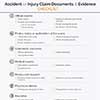
When you place a loved one in a nursing home, it's a hard decision and transition. Often, it comes at a time of medical crisis or other upheaval and you might feel guilt or sadness about their being there at all.
But in most cases, it’s the safest and best place for an elderly person to be once they’re no longer able to manage their own care and support. And you can still be a loving child, other relative or friend, even if you live far away or don’t have the means to care for them in your own home.
Unfortunately, though, some nursing home residents face abuse by staff or other residents during their time there. And even if you’re not there every day, you can still be alert to the signs of nursing home abuse and be part of the solution if you’re concerned.
If you believe that nursing home abuse is occurring, here are the steps you can take to hold the nursing home accountable and prevent further issues.
What is South Carolina nursing home abuse?
Nursing home abuse typically falls into one (or more) of five categories:
- Physical abuse
- Neglect
- Sexual abuse
- Mental abuse
- Financial abuse
You might suspect (or know for sure) that abuse is happening and not know what steps you can take to prevent it or hold the nursing home accountable.
First, do what you can to make sure that your loved one is safe in the immediate sense and is having their needs met.
Removing someone from a nursing home
If there’s an immediate or imminent danger, you might wish to remove a patient from the nursing home.
If the patient can make this decision independently, they usually have the option to leave if they choose. If they have been diagnosed with cognitive issues, then they have a designated legal advocate who can make the decision. A legal advocate would be anyone who has power of attorney, either designated by the patient or by the court.
Making a complaint against a South Carolina nursing home
The South Carolina Department of Health and Environmental Control (DHEC) is required to investigate a nursing home that could be in violation of the state’s licensing standards.
You can file a complaint and request confidentiality so that the DHEC won’t disclose your identity. After the DHEC investigates your complaint, it will send you a written report of its findings.
You can report suspected abuse of a vulnerable adult to South Carolina Adult Protective Services at 1-888-CARE4US.
Be prepared that when you call, your complaint will be assessed to determine whether it meets these elements:
- The adult is vulnerable under the legal definition.
- There is an allegation of abuse, neglect or exploitation.
- The abuse or neglect occurred in the community.
- The abuse or neglect was caused by a caregiver or the vulnerable adult, themself.
There are several other agencies where you can make a report.
- If your loved one lives in a licensed nursing home, community residential care facility or assisted living facility, you could call the Long Term Care Ombudsman at 1 (800) 868-9095.
- If your loved one is in a residential facility operated by the Department of Mental Health or Department of Disabilities and Special Needs, call the SLED Special Victims Unit at 1 (866) 200-6066.
- If the patient is at home or in the community, call Adult Protective Services at DSS at 1 (888) 227-3487.
- If you believe the vulnerable adult is a victim of identity theft or a scam, call the Department of Consumer Affairs at 1 (800) 922-1594.
Preserve evidence and have an air-tight claim
Here are four tips for reporting nursing home abuse in South Carolina:
1. Follow up on your loved one’s safety and well-being.
If you visit or speak with your loved one on the phone and something just doesn’t seem right, trust your instincts. You have a right to ask questions. If you spot an issue, don’t be afraid to speak up. Bring it to the attention of a staff member, and then make sure it’s been corrected. If not, you move to the next step.
2. Take notes/document concerns.
This doesn’t have to be anything fancy, but if you see something concerning, take some notes on what it is. This should include the date, any involved staff member, and what happened that was concerning.

Checklist of 30 items to help you prepare for making a personal injury or accident claim
Download in PDF format
You should also note any conversations or communication you have with staff to try to address the issue. It will be much more compelling as you build a case to have specific dates, names and information about the issues than if you have to try to remember it later.
3. File your complaint.
If you’re ready to use the information you’ve gathered to file a complaint, you can do so by contacting the South Carolina Abuse and Neglect Online Referral System.
4. Contact a nursing home abuse lawyer.
You want what’s best for your loved one, particularly as they face their final years, months or weeks. They might be someone who took care of you in your youth, and now it’s time for you to step up for them when they can no longer advocate for their own self-interests.
That’s why it’s crucial that you get the help you need—quickly—to be able to help them live safely and peacefully.

